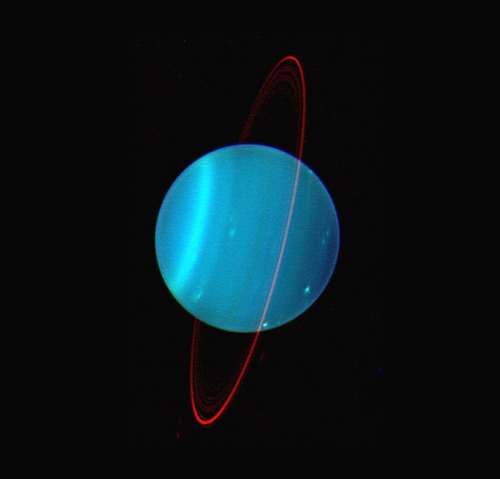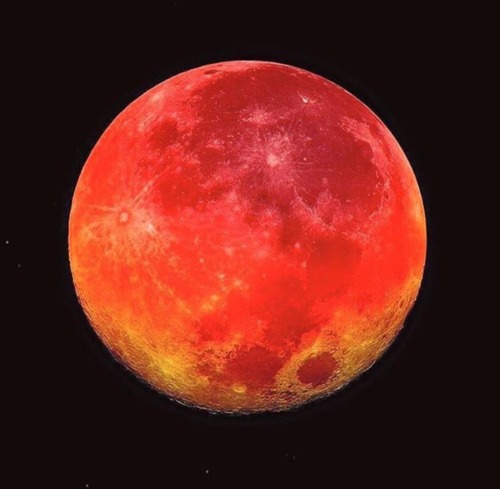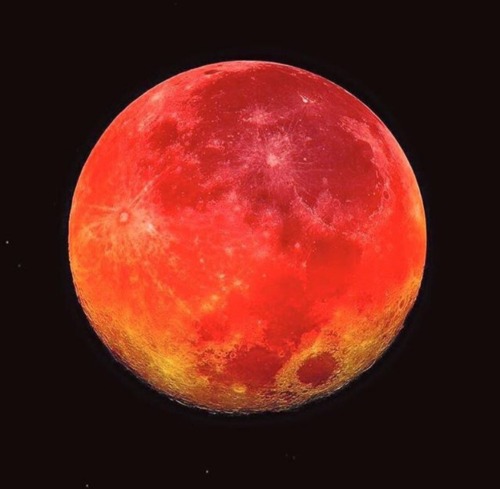Masterpieces Of Mesozoic Seas

Masterpieces of Mesozoic Seas
More Posts from Starry-shores and Others

I had a really stupid idea and had to paint it for a friend.
Ten interesting facts about Uranus
Like the classical planets, Uranus is visible to the naked eye, but it was never recognised as a planet by ancient observers because of its dimness and slow orbit. Sir William Herschel announced its discovery on 13 March 1781, expanding the known boundaries of the Solar System for the first time in history and making Uranus the first planet discovered with a telescope.

Uranus is the seventh planet from the Sun. It has the third-largest planetary radius and fourth-largest planetary mass in the Solar System. Uranus is similar in composition to Neptune, and both have different bulk chemical composition from that of the larger gas giants Jupiter and Saturn.

(The five largest moons of Uranus) Like all of the giant planets, Uranus has its share of moons. At present, astronomers have confirmed the existence of 27 natural satellites. But for the most part, these moons are small and irregular.

Uranus’ moons are named after characters created by William Shakespeare and Alexander Pope. These include Oberon, Titania and Miranda. All are frozen worlds with dark surfaces. Some are ice and rock mixtures. The most interesting Uranian moon is Miranda; it has ice canyons, terraces, and other strange-looking surface areas.

Only one spacecraft in the history of spaceflight has ever made a close approach to Uranus. NASA’s Voyager 2 conducted its closest approach to Uranus on January 24th, 1986, passing within 81,000 km of the cloud tops of Uranus. It took thousands of photographs of the gas/ice giant and its moons before speeding off towards its next target: Neptune.

Uranus has rings: All the gas and ice giants have their own ring systems, and Uranus’ is the second most dramatic set of rings in the Solar System.

Uranus makes one trip around the Sun every 84 Earth years. During some parts of its orbit one or the other of its poles point directly at the Sun and get about 42 years of direct sunlight. The rest of the time they are in darkness.

All of the planets in the Solar System rotate on their axis, with a tilt that’s similar to the Sun. In many cases, planet’s have an axial tilt, where one of their poles will be inclined slightly towards the Sun. But the axial tilt of Uranus is a staggering 98 degrees! In other words, the planet is rotating on its side.

Uranus is approximately 4 times the sizes of Earth and 63 times its volume.

Uranus is blue-green in color, the result of methane in its mostly hydrogen-helium atmosphere. The planet is often dubbed an ice giant, since 80 percent or more of its mass is made up of a fluid mix of water, methane, and ammonia ices.

Uranus hits the coldest temperatures of any planet. With minimum atmospheric temperature of -224°C Uranus is nearly coldest planet in the solar system. While Neptune doesn’t get as cold as Uranus it is on average colder. The upper atmosphere of Uranus is covered by a methane haze which hides the storms that take place in the cloud decks.
source
source
source
Images credit: NASA/ wikipedia



“You’re basically seeing all of the sunrises and sunsets across the world, at once, being reflected off the surface of the moon” – NASA
Incredible view of Fanjingshan or mount Fanjing, Guizhou, China
Guizhou, China 😍✈️
viajarbaratoemelhor
10 Ways to BBQ on an Alien World
There are over 3,700 planets in our galaxy. Many of them orbit stars outside our solar system, these are known as exoplanets. Spend a summer weekend barbecuing it up on any of these alien worlds.
(WARNING: Don’t try any of this on Earth—except the last one.)
1. Lava World
Janssen aka 55 Cancri e

Hang your steak on a fishing pole and dangle your meat over the boiling pools of lava on this possible magma world. Try two to three minutes on each side to get an ashy feast of deliciousness.
2. Hot Jupiter
Dimidium aka 51 Pegasi b

Set your grill to 1800 degrees Fahrenheit (982 degrees Celsius) or hop onto the first exoplanet discovered and get a perfect char on your hot dogs. By the time your dogs are done, it’ll be New Year’s Eve, because a year on this planet is only four days long.
3. Super Earth
HD 40307 g

Super air fry your duck on this Super Earth, as you skydive in the intense gravity of a planet twice as massive as Earth. Why are you air frying a duck? We don’t know. Why are you skydiving on an exoplanet? We’re not judging.
4. Lightning Neptune
HAT-P-11b

I’ve got steaks, they’re multiplying/and I’m looooosing control. Cause the power this planet is supplying/is electrifying!
Sear your tuna to perfection in the lightning strikes that could flash across the stormy skies of this Neptune-like planet named HAT-P-11b.
5. Red Earth
Kepler-186f

Tired of all that meat? Try a multi-colored salad with the vibrant plants that could grow under the red sun of this Earth-sized planet. But it could also be a lifeless rock, so BYOB (bring your own barbecue).
6. Inferno World
Kepler-70b

Don’t take too long to prep your vegetables for the grill! The hottest planet on record will flash-incinerate your veggies in seconds!
7. Egg-shaped
WASP-12b

Picture this: You are pressure cooking your chicken on a hot gas giant in the shape of an egg. And you’re under pressure to cook fast, because this gas giant is being pulled apart by its nearby star.
8. Two suns
Kepler-16b

Evenly cook your ribs in a dual convection oven under the dual stars of this “Tatooine.” Kick back and watch your two shadows grow in the fading light of a double sunset.
9. Takeout
Venus

Order in for a staycation in our own solar system. The smell of rotten eggs rising from the clouds of sulfuric acid and choking carbon dioxide will put you off cooking, so get that meal to go.
10. Take a Breath
Earth

Sometimes the best vacations are the ones you take at home. Flip your burgers on the only planet where you can breathe the atmosphere.
Grill us on Twitter and tell us how bad our jokes are.
Read the full version of this week’s ‘Solar System: 10 Things to Know’ Article HERE.
Make sure to follow us on Tumblr for your regular dose of space: http://nasa.tumblr.com.

Sh2-101, Cygnus
Helicoprion: What if, like, teeth,
Mesosaurus: Yeah?
Helicoprion: but WHEEL
Mesosaurus: No don't -
Helicoprion:

(Image by ДиБгд)
Here are some interesting facts about the raven:
• They are one of the most intelligent birds on the planet - they can solve tasks, play tricks on other animals and can count
• Ravens can imitate human speech just like parrots
• They can reach 2 feet in size from head to tail - bigger than some cats
• Ravens do things just for fun, such as sliding down snowy hills, swooping when flying, and they even build their own toys out of sticks and rocks
• People who have owned ravens have said they are cat-like in nature and can be very cuddly and affectionate, but can throw a strop when they don't get their way
• Science has found that ravens can communicate by "gesturing", and point their beak in certain directions to tell other ravens where to go
• When they reach adolescence, ravens leave their parents to find other teenage ravens and join "teenage gangs"
• Ravens are monogamous and mate for life
• Although they have been seen for centuries to represent death and sadness, ravens are compassionate, loving animals and will console their raven friends if they have been injured
All in all, ravens are amazing and beautiful animals!





-
 wildernestt reblogged this · 8 months ago
wildernestt reblogged this · 8 months ago -
 wildernestt reblogged this · 1 year ago
wildernestt reblogged this · 1 year ago -
 happynow-here reblogged this · 3 years ago
happynow-here reblogged this · 3 years ago -
 onemoretime reblogged this · 3 years ago
onemoretime reblogged this · 3 years ago -
 equillibrium reblogged this · 3 years ago
equillibrium reblogged this · 3 years ago -
 equillibrium liked this · 3 years ago
equillibrium liked this · 3 years ago -
 arachneedle liked this · 3 years ago
arachneedle liked this · 3 years ago -
 hangfiretales reblogged this · 3 years ago
hangfiretales reblogged this · 3 years ago -
 hangfiretales liked this · 4 years ago
hangfiretales liked this · 4 years ago -
 sandersfanders1 liked this · 4 years ago
sandersfanders1 liked this · 4 years ago -
 low-level--00 reblogged this · 4 years ago
low-level--00 reblogged this · 4 years ago -
 low-level--00 liked this · 4 years ago
low-level--00 liked this · 4 years ago -
 enchantingcolortacogarden liked this · 4 years ago
enchantingcolortacogarden liked this · 4 years ago -
 anomalous-skink liked this · 4 years ago
anomalous-skink liked this · 4 years ago -
 t-rex-snack reblogged this · 4 years ago
t-rex-snack reblogged this · 4 years ago -
 laceofcoins liked this · 4 years ago
laceofcoins liked this · 4 years ago -
 peacockplumes reblogged this · 4 years ago
peacockplumes reblogged this · 4 years ago -
 ghost-in-a-wasteland reblogged this · 4 years ago
ghost-in-a-wasteland reblogged this · 4 years ago -
 beepaws liked this · 4 years ago
beepaws liked this · 4 years ago -
 onceuponaprincey liked this · 4 years ago
onceuponaprincey liked this · 4 years ago -
 goocerberus liked this · 4 years ago
goocerberus liked this · 4 years ago -
 starry-shores reblogged this · 5 years ago
starry-shores reblogged this · 5 years ago -
 an-abyss-called-life liked this · 5 years ago
an-abyss-called-life liked this · 5 years ago -
 rawrrawr0221 liked this · 5 years ago
rawrrawr0221 liked this · 5 years ago -
 kazzle-the-dazzle reblogged this · 5 years ago
kazzle-the-dazzle reblogged this · 5 years ago -
 kazzle-the-dazzle liked this · 5 years ago
kazzle-the-dazzle liked this · 5 years ago -
 alnitakt liked this · 5 years ago
alnitakt liked this · 5 years ago -
 robomatryoshka liked this · 5 years ago
robomatryoshka liked this · 5 years ago -
 wootzcrawfish reblogged this · 5 years ago
wootzcrawfish reblogged this · 5 years ago -
 wootzcrawfish liked this · 5 years ago
wootzcrawfish liked this · 5 years ago -
 tsundoku78 reblogged this · 5 years ago
tsundoku78 reblogged this · 5 years ago -
 tsundoku78 liked this · 5 years ago
tsundoku78 liked this · 5 years ago -
 nobodyshunter liked this · 5 years ago
nobodyshunter liked this · 5 years ago -
 good-chives-only reblogged this · 5 years ago
good-chives-only reblogged this · 5 years ago -
 brisas-e-ventos liked this · 5 years ago
brisas-e-ventos liked this · 5 years ago -
 andoniss reblogged this · 5 years ago
andoniss reblogged this · 5 years ago -
 sumptuousfete reblogged this · 5 years ago
sumptuousfete reblogged this · 5 years ago -
 royalnessmale liked this · 5 years ago
royalnessmale liked this · 5 years ago -
 1636271retired liked this · 5 years ago
1636271retired liked this · 5 years ago -
 protologisme liked this · 5 years ago
protologisme liked this · 5 years ago -
 deathgripslingerie reblogged this · 5 years ago
deathgripslingerie reblogged this · 5 years ago

Amateur astronomer, owns a telescope. This is a side blog to satiate my science-y cravings! I haven't yet mustered the courage to put up my personal astro-stuff here. Main blog : @an-abyss-called-life
212 posts

